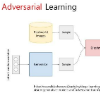Urban planning refers to the efforts of designing land-use configurations given a region. However, to obtain effective urban plans, urban experts have to spend much time and effort analyzing sophisticated planning constraints based on domain knowledge and personal experiences. To alleviate the heavy burden of them and produce consistent urban plans, we want to ask that can AI accelerate the urban planning process, so that human planners only adjust generated configurations for specific needs? The recent advance of deep generative models provides a possible answer, which inspires us to automate urban planning from an adversarial learning perspective. However, three major challenges arise: 1) how to define a quantitative land-use configuration? 2) how to automate configuration planning? 3) how to evaluate the quality of a generated configuration? In this paper, we systematically address the three challenges. Specifically, 1) We define a land-use configuration as a longitude-latitude-channel tensor. 2) We formulate the automated urban planning problem into a task of deep generative learning. The objective is to generate a configuration tensor given the surrounding contexts of a target region. 3) We provide quantitative evaluation metrics and conduct extensive experiments to demonstrate the effectiveness of our framework.
翻译:城市规划是指设计一个区域所具备的土地使用配置的努力。然而,为了获得有效的城市规划,城市专家必须花费大量的时间和精力,根据领域的知识和个人经验分析复杂的规划制约。为了减轻这些制约的沉重负担和制定一致的城市规划,我们想问,为了减轻这些制约的沉重负担,我们是否AI能够加速城市规划进程,以便人类规划者只根据具体需要调整生成的配置?最近深层基因化模型的推进提供了可能的答案,从而激励我们从对抗性学习的角度实现城市规划的自动化。然而,出现了三大挑战:(1) 如何界定量化的土地使用配置?(2) 如何进行自动化的配置规划?(3) 如何评估生成的配置的质量?在本文件中,我们系统地应对这三项挑战。具体地说,(1) 我们把土地使用配置定义为长度纬道高温。(2) 我们把自动化城市规划问题纳入深层基因化学习的任务中。我们的目标是根据目标区域的周围环境来形成一个配置变压器。(3) 我们提供定量评价指标并进行广泛的实验,以证明我们框架的有效性。





